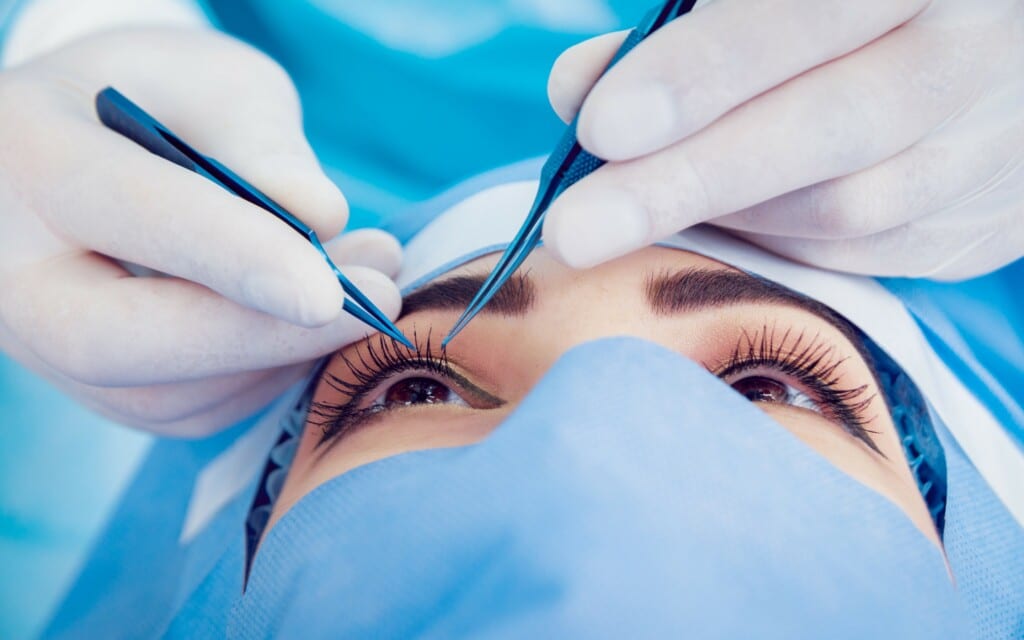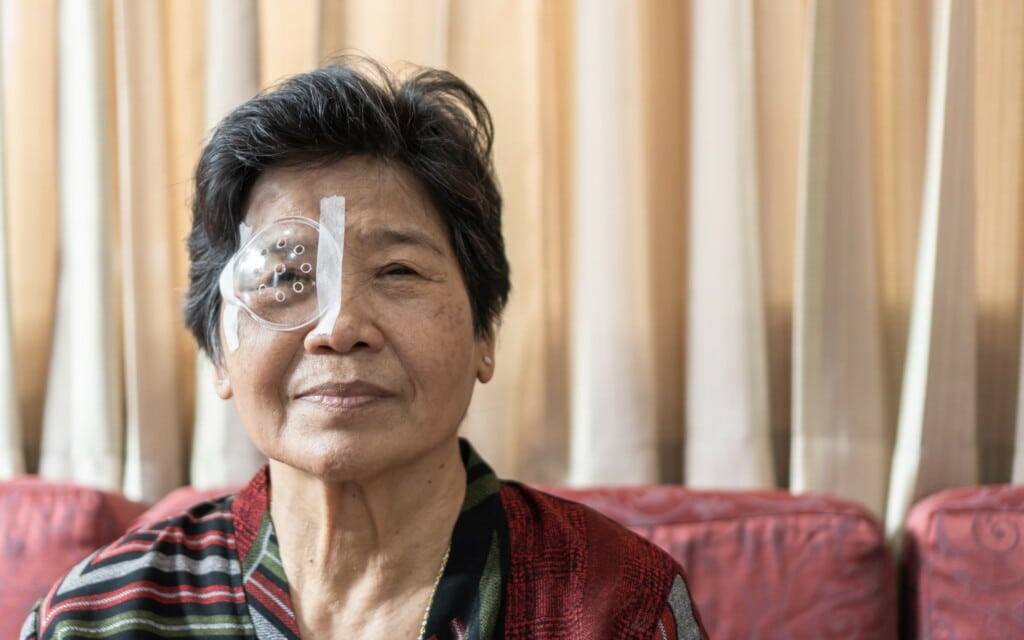Choosing the best sleeping position after cataract surgery will help to minimize your risk of discomfort during recovery. It will also accelerate healing. Unfortunately, it can be notoriously difficult to figure out the right position for sleeping after a surgical procedure.
Today we’ll be covering how to sleep after cataract surgery as well as why getting you cataracts removed might improve your overall circadian rhythm.
Cataracts are a relatively common condition affecting people around the world, particularly as you get older. More than half of all Americans over the age of 80 have either had surgery to remove cataracts, or are currently living with the condition.
The best way to manage cataracts is with a commonplace surgery. The procedure can take as little as ten minutes to complete. Some people even report having clearer vision within a few hours of their surgery. The recovery time for many patients is quite quick.
Although complete recovery can take a month or longer, you should find that you’re not dealing with may side effects after a few days.
Still, as simple as cataract surgery can be, and as fast as the recovery time often is, there may still be a period when you’re struggling to get the best night’s sleep. Here’s what you need to know about finding the right sleep position after cataract surgery.
What is the best sleep position after cataract surgery?
As mentioned above, cataract surgery is a relatively commonplace procedure with a minimal recovery time. There’s very little you’ll need to do during the recovery period, aside from getting plenty of rest. Use your eyedrops and follow the instructions given on the day of the operation.
When it comes to getting a good night’s sleep, most people find the cataract surgery doesn’t affect the quality of their sleep. The protective shield covering your eye after the surgery will stop you from accidentally rubbing the affected area during the night. However, surgeons still recommend avoiding sleeping on the side of your operated eye for at least 24 hours.
The primary reason to avoid sleeping on the same side as the operated eye is you may have a higher risk of knocking the shield out of place, or allowing it to slip throughout the night. When you’re sleeping on your back, this is less problematic.
How long do I have to sleep on one side after cataract surgery?
Sleeping on your back for the first few nights after you stop wearing your eye shield can be valuable. Complications following cataract surgery are extremely rare, but presence of dust and other particles around your pillows could mean you have a higher risk of infection when sleeping on your side. Do follow your doctors instructions about how long to sleep on your back.
Should you sleep with your head elevated after cataract surgery?
Generally, you won’t need to elevate your head after cataract surgery unless your doctor asks you to do so. High eye pressure can be problematic after cataract surgery. You shouldn’t experience this issue unless your head is positioned below your waist.
Do you have to sleep sitting up after cataract surgery?
Though it’s important not to bend too often after cataract surgery (to avoid placing pressure on your eye), you shouldn’t need to sleep sitting up. If you feel safer sleeping in a recliner the first couple of nights, there’s nothing wrong with that either.

How to sleep after cataract surgery: The basics
Sleep is an essential part of the human healing process. After cataract surgery, it will be crucial to get as much sleep as possible. Sleeping keeps you healthy and allows the eye to heal. The good news is cataract surgery shouldn’t have a massive impact on your sleep pattern.
The most important thing you can do when sleeping after cataract surgery, is follow the instructions of your surgeon. Your surgeon will be able to provide you with insights into the best sleeping position after cataract surgery (often on your back). You’ll need to take it easy for 2-3 days after the procedure.
You’ll also need to continue wearing the shield provided by your surgeon for as long as they ask you to. This protective shield will prevent you from rubbing your eye when it’s healing.
Remember to follow the basic guidelines for good sleep, such as:
- Following a consistent sleep schedule: This will help to maintain your circadian rhythm and should ensure you can fall asleep and wake up at the correct times more easily.
- Avoid alcohol: Alcoholic drinks could make your pain worse, or cause side-effects following your surgery. It’s best to avoid drinking until your surgeon advises otherwise.
- Find ways to relax: Try to relax as much as possible before bed, and take any painkillers prescribed to you to reduce your feelings of discomfort when you’re going to sleep.
- Reduce stimulants: Minimize the amount of stimulating substances you get into your diet throughout the day to reduce your risk of insomnia.
- Stay comfortable: Try to make yourself as comfortable as possible, with cosy pillows, loose bedclothes, and setting your thermostat to the right temperature in your bedroom.
What positions are to be avoided after cataract surgery?
If you struggle to get to sleep in anything other than their favorite position, you should still have some freedom with cataract surgery. You’ll be able to sleep on your back, or on the opposite side to the eye recovering from surgery.
It’s also worth noting you should be able to go back to sleeping as normal within a few weeks. It’s important to follow any instructions given by your doctor in this regard.
You’ll also need to avoid other strenuous positions which might cause pressure for your eye following surgery. Outside of finding the best sleeping position after cataract surgery, make sure you:
- Avoid strenuous exercise: Take a break from rigorous exercise and activities which might require heavy lifting for a few weeks to reduce the risk of increased eye pressure.
- Don’t bend too often: Bending to positions which place your head below your waist will increase eye pressure and may make it harder for your eye to heal.
- Get plenty of rest: Try to avoid using your eye too much, and keep the shield over your eye for as long as advised by your doctor to keep issues to a minimum.
- Avoid irritants and trauma: It’s natural to feel like something is in your eye after cataracts surgery, but you shouldn’t start rubbing at the surgery site. Make sure you protect yourself from any irritants even after removing your eye shield with a pair of sunglasses.
- Don’t bathe straight away: Exposure to water can still put your eye at risk of irritation and infection for a few days after cataract surgery. It’s worth making sure you don’t allow the stream of water in your shower to hit your eye directly.

Better sleep altogether after cataract surgery?
As mentioned above, after cataracts surgery, getting as much rest as possible is a good way to accelerate healing. Fortunately for those suffering from cataracts and insomnia at the same time, there may be some good news involved in having your cataracts removed.
Interestingly, some studies indicate cataract surgery could have an overall positive influence on sleep. When the old lens gets exchanged, the bright morning sunlight is again perceived by the brain, resetting the circadian rhythm.
Some patients have even received a blue-light blocking lens as a way of permanently reducing their exposure to this type of light. As known to most people, excess blue light prevent great slumber.
One study into cataracts and sleep found the people who had their cataracts removed not only slept better than their counterparts, but their quality of sleep was better too.
If you’ve been suffering from cataracts for some time, you may find having your cataracts removed ensures you can have a better quality of rest following recovery from your surgery.
Finding the right sleeping position after cataract surgery
Finding the best sleeping position after cataract surgery can feel complex the first few days. The good news is you shouldn’t have too many restrictions on how you sleep. For most people, it will be possible to sleep either on your back, or the opposite side to your surgery.
If you’re concerned about sleeping after cataract surgery, or you feel you might be having side effects which prevent a good night’s sleep, the best thing you can do is seek help from a medical professional. Talk to your surgeon about how to manage your sleep following surgery.
Siestio. Sleep Matters.
Now read these:
—Sleeping after shoulder surgery
—How to sleep after liposuction
—Sleep with painful hemorrhoids
Medical disclaimer
You must not rely on the information provided on our website as an alternative to medical advice from your doctor or other healthcare professionals. For more information read our full disclaimer here.







